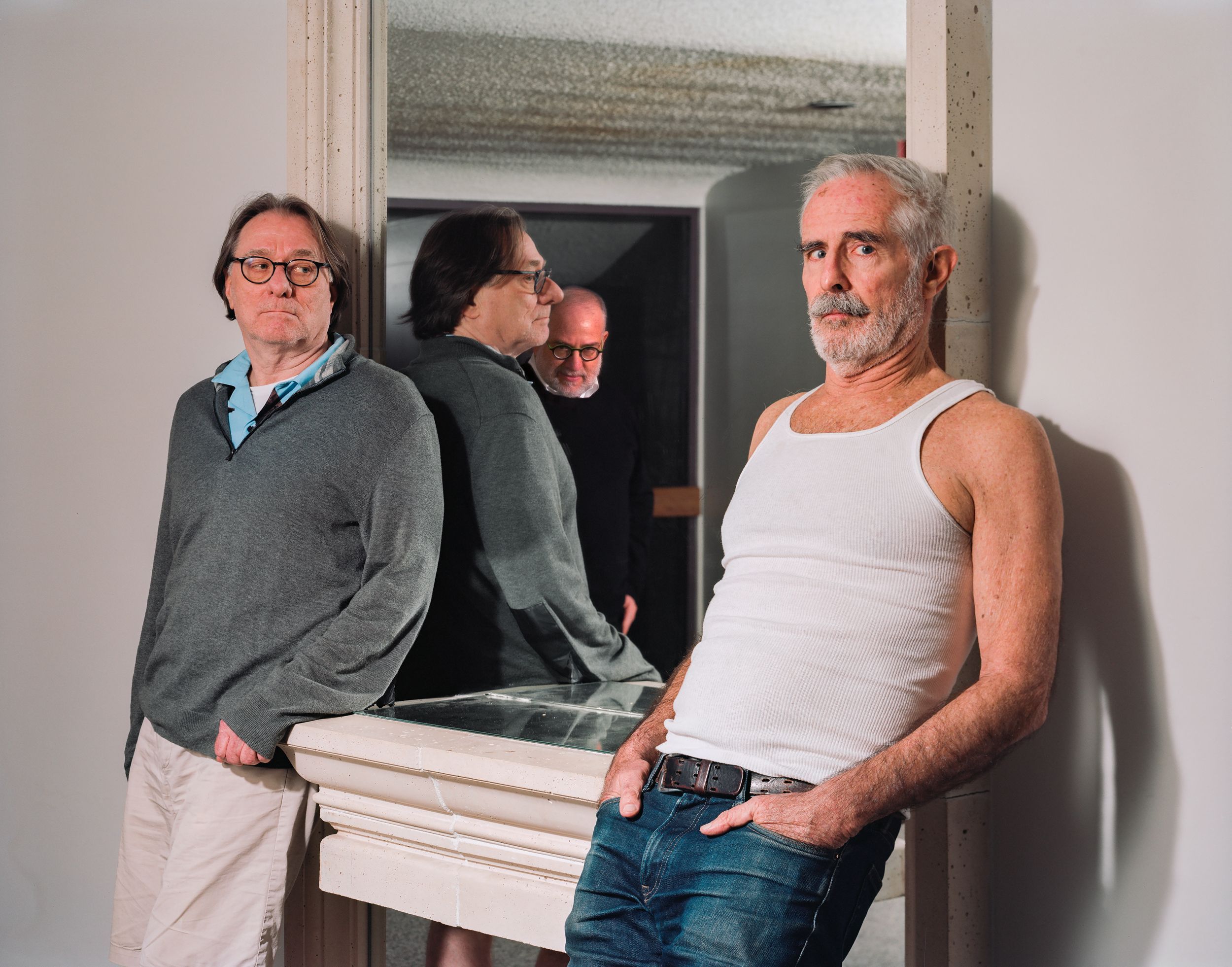IT’S BETTER TO START OUT UGLY, written and directed by Asher Hartman, at JOAN, Los Angeles, August 4–6, 2023.
Martin Harries reports:
The audience, on three sides, can at first imagine that they are on the edges of a realist play—facing a cot, a rudimentary kitchen table, a pair of loosely suggested windows with hopelessly broken blinds. Like us, three men wait for things to begin: one does push-ups, one may be asleep, the third glowers in his folding chair. The play begins as John (Philip Littell) and Alfred (Michael Bonnabel) protest their lot—the landlord shits on them—and talk lasciviously about the virtues of mayonnaise over mustard slathered on bread. The third man, Sebastiano (José Luis Blondet) makes the occasional noise: comments on the action, random sounds? John and Alfred are this play’s Didi and Gogo, George and Martha: a couple together for so long that they are inseparable despite the rage each inspires in the other.
Like the summer’s blockbuster behemoth, Barbie, writer and director Asher Hartman’s It’s Better to Start Out Ugly is about white male rage and its myriad expressive forms. Sebastiano plays Pozzo to the other actors’ Didi and Gogo; all three, at times, get to be Lucky. Idioms of various selves pass unpredictably through the bodies on stage. Each actor finds an astonishing range of pleas, shouts, grunts, songs. The great soprano Montserrat Cabellé presides as an object of adoration, and the desire for an aria that would say everything is the utopian reverse side of the thwarted, rageful soliloquies that these bodies can muster. On opening night, a dog in the audience howled in response to an actor’s shout, and that bark spoke for the silent human audience.
A program note orients us: “The men in Ugly, once beautiful, have become outcasts in what they perceive as their culture, competing for power, inhabited by the residue of their shadow histories.” If Barbie satisfies a fantasy that impassioned truth-telling can awake the oppressed from false consciousness, It’s Better to Start Out Ugly puts us in intimate proximity with a rage that no expression can appease. Is it better to start out ugly because such a beginning is less likely to sow the seeds for the violent rage that follows from not collecting on what one believes one has deserved?
To pose this question might suggest that the play, while offering no palliative, at least puts a topic for debate before its audience its audience. No: it’s a mess, of the best and most disorienting kind. Snatches of plot surface quickly, only to vanish as fast. Does Philip pay the rent with blowjobs? Is the child’s voice Alfred hears in the pipes his own? Is Sebastiano the agent of some underground surveillance network?
Voices traverse bodies, and Asher Hartman is nothing if not one of the gravediggers in the ceremony of the long death of character Elinor Fuchs declared as early as 1995. That Fuchs’ term is still useful today testifies to how reluctant we are to let character die. Hartman’s awareness of the ways bodies cling to self-consistency despite the violent conflict of the voices that traverse them seems simply right. Despite or because of this violent cacophony, Alfred, Philip, and Sebastiano defend the solidity of their queer bodies with varying degrees of success. A group hug at the end comes as a relief, but the abuse continues.
It’s Better to Start Out Ugly plays for small audiences for three nights. An elevator up to the seventh floor and a corridor takes one to the hospitable JOAN. It’s August in L.A.: windows remain open in the warm gallery. Sometimes one can feel sure that an ambient noise—a siren, a loud engine—comes from outside. Very often, one can’t.
¤
Promotional image featuring Michael Bonnabel, José Luis Blondet, and Philip Littell. Photo by Ian Byers-Gamber.
LARB Short Take live event reviews are published in partnership with the nonprofit Online Journalism Project and the Independent Review Crew.
LARB Contributor
Martin Harries is professor of English at UC Irvine. The author of Forgetting Lot’s Wife: On Destructive Spectatorship, he is working on “Theater after Film,” a book about the impact of mass culture on postwar drama.
Did you know LARB is a reader-supported nonprofit?
LARB publishes daily without a paywall as part of our mission to make rigorous, incisive, and engaging writing on every aspect of literature, culture, and the arts freely accessible to the public. Help us continue this work with your tax-deductible donation today!
